About PCC
Precision Castparts Corp. is a worldwide, diversified manufacturer of complex metal components and products. It serves the aerospace, power, and general industrial markets.
PCC is the market leader in manufacturing large, complex structural investment castings, airfoil castings, forged components, aerostructures and highly engineered, critical fasteners for aerospace applications.
In addition, the Company is the leading producer of airfoil castings for the industrial gas turbine market.
PCC also manufactures extruded seamless pipe, fittings, forgings, and clad products for power generation and oil & gas applications; commercial and military airframe aerostructures; and metal alloys and other materials to the casting and forging industries.
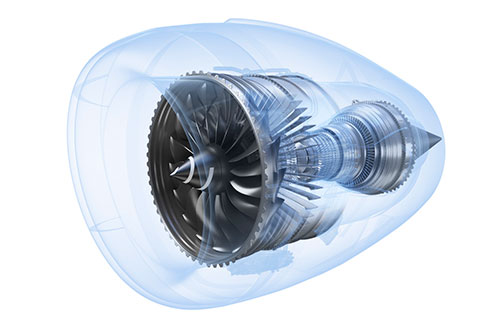
PCC Culture
Precision Castparts Corp. (PCC) is a world-class, global manufacturing organization relentless in its dedication to being the high-quality, low-cost and on-time producer for all of its product lines.
We are dedicated to delivering the highest value to our customers and are continually pursuing strategic, profitable growth.
PCC adheres to high standards in the manufacture of high-quality products that meet the most demanding specifications of its sophisticated customer base.
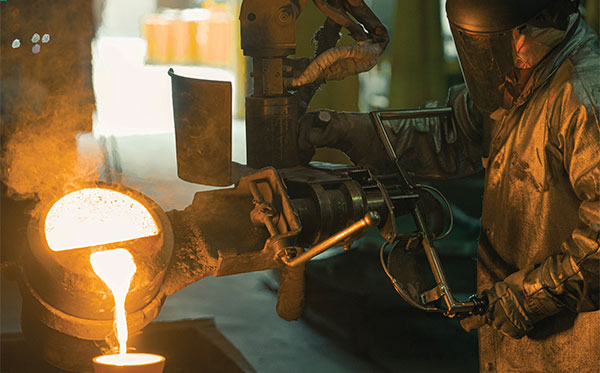
Work Environment
PCC employees excel in a fast-paced, dynamic work environment that rewards performance and results and challenges each employee to reach their full potential through continuous improvement and increased decision-making and authority.
The Company is committed to recruiting, training, and promoting employees who rise to these challenges.
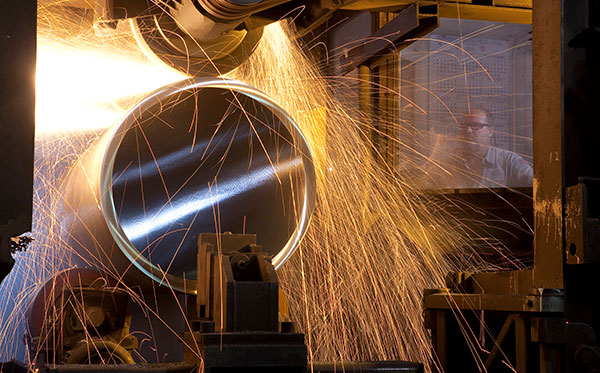
Production Facilities
Each of our production facilities operates as its own business unit, squarely focused on never-ending improvement – quarter after quarter, year after year.
Our plants employ time-tested manufacturing tools to meet this objective. Each quarter, PCC's CEO and segment presidents review the operational results on a plant-by-plant basis to identify opportunities for cost reduction and improved performance. There is always opportunity.
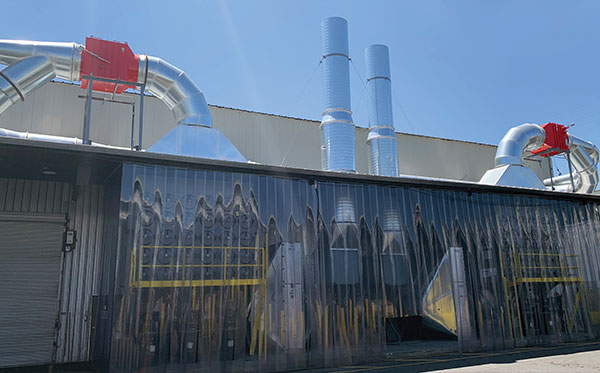
Ethical Standards
All PCC employees share responsibility to maintain the highest legal and ethical standards. Performing with integrity is a way of life and vital to the Company's success.
The PCC Code of Conduct outlines the responsibilities of every employee and is actively enforced worldwide. Additionally, PCC is committed to maintaining a safe and secure workplace for all employees and visitors.
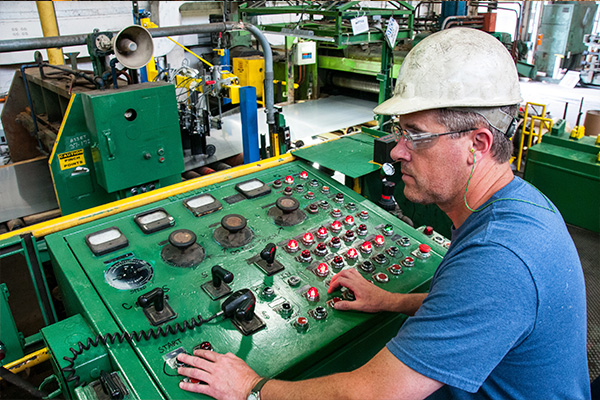
Operating Structure
| Investment Cast Products | Forged Products | Metals Products | Airframe Products |
|---|---|---|---|
| PCC Structurals | Wyman-Gordon Turbine, Rings, Energy |
Special Metals Corp. (SMC) |
PCC Fasteners |
| PCC Airfoils | Wyman-Gordon Structural Forgings |
Titanium Metals Corp. (TIMET) |
PCC Aerostructures |
| PCC Energy Group | PCC Engineered Products |
Precision Castparts Corp. Leadership
Over the course of the company’s history, PCC has been led by just three people: Ed Cooley, Bill McCormick, and current Chief Executive Officer Mark Donegan.
Each made significant contributions during his tenure to make PCC one of the foremost manufacturing companies in the world. PCC was acquired by Berkshire Hathaway in 2016.
Ed Cooley Era
In 1949, Joseph Cox, president and owner of Oregon Saw Chain in Portland, Oregon, started a small investment casting business with the intention of making a special cutter for his chain saw products.
Ed Cooley, assistant general manager for the company, began to spend more and more time with the casting operation and solicited outside work primarily from local businesses. This venture proved so successful that, by the spring of 1953, the casting division was made into a separate business and named Precision Castparts Corp.
Three years later, the company, owned by Cooley and two other individuals, was incorporated under the laws of the State of Oregon. The company pushed aggressively to make ever larger structural castings and, in 1962, purchased a vacuum furnace with the capability of pouring a part weighing up to 1,000 pounds. That moved the business far ahead of its competition and resulted in several contracts for large aircraft engine castings.
Then, in 1967, Precision Castparts was awarded a contract with General Electric for TF39 engine components. The TF39 engine, designed to power the U.S. Air Force C-5 Galaxy heavy military transport, was the first high-bypass turbofan engine and the forerunner of GE’s commercial CF6 family of jet engines, installed on Airbus and Boeing wide-body aircraft around the world. It wasn’t long before Pratt & Whitney signed up to incorporate large structural castings into their JT9D commercial engine, and Precision Castparts became a significant participant in the aerospace industry.
In 1968, Precision Castparts became a public company with the offering of 120,000 shares of common stock to 1,100 new shareholders. At the same time, the company was hard at work developing a process to manufacture titanium castings, adding to its already proven capabilities with nickel and stainless steel alloys. This endeavor eventually resulted in the addition of a new titanium production facility, and Precision Castparts soon became the world’s leading manufacturer of large titanium castings as well. In the meantime, the company also focused on building its own internal capability to melt alloys and to create ingot, the input stock for investment castings. Acquisitions then became the next growth engine.
Precision Castparts acquired a titanium foundry in France from Messier Fonderie d’Arudy early in 1985 and moved the operations into a new plant in Ogeu-les-Bains, France, the following year. This operation continues to prosper today as PCC France, part of PCC Structurals.
In 1986, the acquisition of the airfoils business from TRW nearly doubled the size of the company. The business was a leading producer of investment cast blades and vanes used in the high-temperature turbine sections of aircraft engines. Strategically, this acquisition enabled Precision Castparts to bring a better value equation to the same customers who were buying structural castings.
Bill McCormick Era
Bill McCormick became chief executive officer of Precision Castparts in 1991. He had joined the company in 1985 as president and chief operating officer after a successful manufacturing career with General Electric. Shortly after arriving at the company, he asked Mark Donegan, also from General Electric, to join him. Donegan went to work as a supervisor in the Portland investment casting operations.
McCormick stepped into the CEO role at a time when the cyclical commercial aerospace industry was particularly bad. Airlines were canceling or stretching out the sizeable orders for aircraft they had placed late in the previous decade, and, with more than 80 percent of its sales in aerospace, Precision Castparts was feeling the pain deeply. The company’s board of directors commissioned a study to determine what other types of businesses would generate profitable growth to smooth out the valleys of the aerospace cycle.
This study inspired a series of acquisitions from 1995 to the end of the decade that drew the company into the machine tool and fluid management industries. While these businesses appeared to offer some promise at first, they did not match up well to the company’s core competencies as a manufacturer of complex components for critical applications, which nurtures close interface relationships with original equipment manufacturers, drives process control disciplines throughout its individual operations, and capitalizes on its expertise in and buying power of premium aerospace metals. Most of the acquired businesses had very little, if any, contact with the end users of their products, which were primarily sold through distributors. The products themselves were a collection of components brought together from outside sources, then assembled and tested prior to shipment.
Two major engines of long-term growth were fired up during these years, however. McCormick had the vision to extend the company’s expertise in aerospace airfoil technology and manufacturing to the industrial gas turbine (IGT) industry. Customers were looking for a way to burn the turbines hotter, both to increase overall efficiency and to reduce emissions, and Precision Castparts had the answer. The company began its push into this end market in 1995 with virtually zero market share and, by 2001, its share surpassed 50 percent.
The acquisition of Wyman-Gordon, the world’s premier manufacturer of aerospace forgings, was also completed during the McCormick era. Wyman-Gordon dramatically increased the value proposition that the company could offer to its customers and provided a major platform on which to build a second business segment. In fact, very shortly after this acquisition, Precision Castparts added two hammer forging operations to enhance Wyman-Gordon’s capabilities.
McCormick established a system of metrics that he drove through each individual manufacturing operation. These metrics enable a facility to determine whether it was meeting its budget objectives on a daily basis and to deliver cost reductions quarter after quarter. Each quarter, McCormick visited every plant and reviewed its progress based on these measurements. This system, which continues to be central to Precision Castparts’ success, has enabled the company to become the low cost producer in its end markets and has served as an efficient tool for acquired businesses to get traction quickly on improving their cost structure.
Mark Donegan Era
In 2001, Mark Donegan was named president and chief operating officer of Precision Castparts, and in August of the next two years, he took on the roles of chief executive officer and chairman, respectively. As mentioned earlier, Donegan joined the company as a manufacturing supervisor in Portland in 1985. The acquisition of the airfoils business created many new career opportunities in the company, and Donegan went to Cleveland to run a small ceramic core facility and, soon afterwards, a large aerospace airfoil plant. He returned in the early 1990s to lead the structural casting business through some of the toughest times in the company’s history – driving out costs, reducing lead times, enhancing relationships with long-time customers, and adding important new customers.
With the acquisition of Wyman-Gordon in late 1999, Donegan headed to Massachusetts to turn what had been an ailing business into a strong, vital enterprise with significant opportunities for profitable growth. In all of these assignments, he developed a keen focus on a manufacturing operation’s daily metrics and the requirements for a business’s long-term success.
The aerospace industry was mired at the bottom of one of its cycles when Donegan took the reins as chief executive officer. He seized this downturn as an opportunity. Confident in the operations’ ability to reduce cost structures going forward, Donegan offered major aerospace customers deflationary pricing in exchange for longer term contracts and market share gains. This approach proved so successful that, when the new contracts kicked in at the beginning of 2003, the company had the largest number of parts under development in its history. As these components moved into production, and the cycle ramped back up, Precision Castparts achieved unprecedented sales levels.
While continuing to drive the daily manufacturing discipline through the plants, Donegan focused on profitable growth by diligently pursuing strategic acquisitions that complemented the company’s core competencies. In late 2003, the company acquired SPS Technologies, a manufacturer of fasteners, primarily for critical aerospace applications. Just as Wyman-Gordon had, SPS served as a platform on which to build an all-new segment: Fastener Products. Since the acquisition, five additional fastener businesses have been added to expand its complement of products to offer to aircraft and engine customers. Cannon-Muskegon, a manufacturer of nickel-based alloys for the casting industry, was also part of the SPS deal and enabled Precision Castparts to meet all its casting requirements for nickel ingot internally.
The acquisition of Special Metals in 2006 guaranteed a similar nickel-based independence for the company’s forging businesses. Before Special Metals, Wyman-Gordon was buying all its nickel billet from outside suppliers; now the forging operation gets more than 70 percent of its billet from Special Metals. In addition, this acquisition opened up sizeable opportunities in general industrial markets previously untapped by Precision Castparts, including oil & gas, chemical transport, and industrial processing. The internal capability to melt alloy and create the input stock for forgings, castings, and fasteners inspired the acquisition of Caledonian the following year. Caledonian’s expertise is sorting, cleaning, and reconditioning metal revert, which can then be reused to manufacture components – often at a considerable discount to virgin metals.
Donegan also exploited underutilized internal assets to enter new markets. Wyman-Gordon’s ability to extrude long lengths of seamless pipe was just a footnote at the time of acquisition. However, no one had conceived of this pipe’s value in coal-fired plant applications. China and India have since purchased billions of dollars of this pipe to connect the boiler to the steam turbine. Wyman-Gordon formed an Energy Group specifically targeted on products such as 9 5/8” downhole casing, subsea clad pipe, and specialized forgings.
Acquisitions will continue to play a major role in Precision Castparts’ long-term strategy. Forged Products has significantly broadened its product offerings to expand its reach into both aerospace and oil & gas end markets. Similarly, Airframe Products has added further aerospace fastener assets to its portfolio and has aggressively acquired aerostructures companies to complement Primus International’s line of complex components and assemblies. And, in addition to providing a critical, internal supply of titanium, the acquisition of TIMET opens up a vast range of operational synergies and solid opportunities for top- and bottom-line growth.
PCC History
The Beginning
The story of PCC begins in Portland, Oregon in 1947 with Joseph B. Cox, the founder and president of Oregon Chain Saw Manufacturing Co. — known today as Blount International, Inc. You may recognize the OREGON name as a current brand of chainsaw equipment.
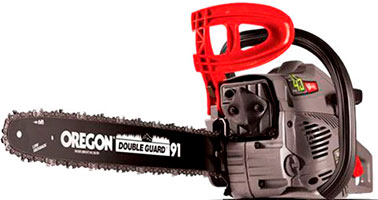
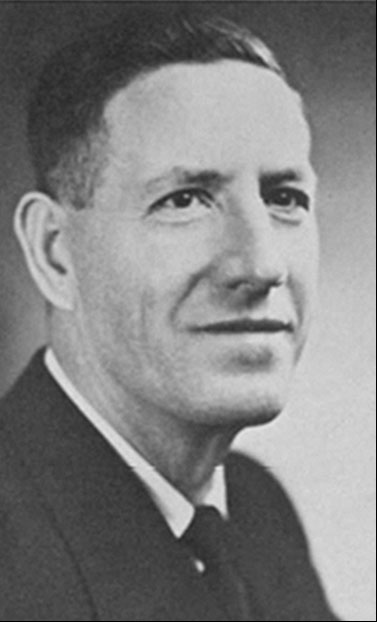
Joseph B. Cox
The Inspiration
Cox observed how effectively timber beetle larvae, the size of a man’s forefinger, were easily chewing their way through timber. He thought replicating the larva’s alternating C-shaped jaw with a metal chain saw cutter would improve the saw chain type at the time.
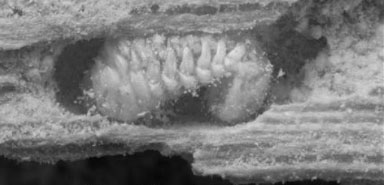
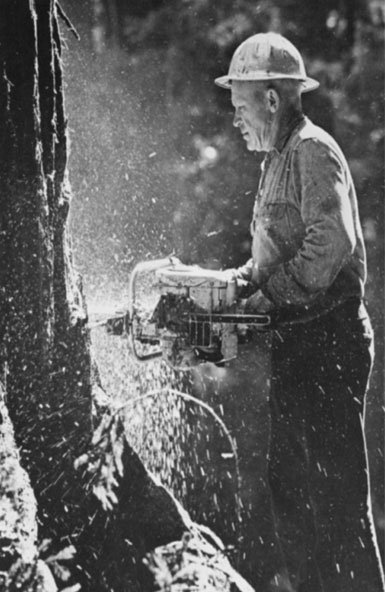
The result… a revolutionary new product
Mr. Cox needed to affordably cast his new cutter, so the investment casting side of the business was born.
The Cox Chipper Chain is still considered the biggest influence in the history of timber cutting.

-
1947

Cox Chipper Chain
Small investment casting operation is established with 10 employees. PCC produces more than 10 million saw chain cutters before the product line is dropped in favor of larger, more complex castings.
-
1952

Ed Cooley
Ed Cooley begins running the investment casting operation.
-
1953

First Location
Precision Castparts is formed with Joseph Cox as owner and president; Cooley is GM with 20 employees. The original building is located on SE 13th, Portland, OR
-
1955

SE Johnson Creek
PCC moves to its Johnson Creek facility (still in operation today) and grows to 40 employees.
-
1957

Ed Cooley and partners purchase PCC
Cooley becomes PCC's first CEO and has 90 employees.
-
1959

Hand-Dipped Shell System
PCC experiences a major breakthrough when it develops a new investment casting technology that allows for larger castings.
-
1965

General Electric Launches TF-39 Jet Engine
GE provides a 40,000-pound thrust engine for the C-5A Transport. The engine was the TF-39; it was 3-times the size of the largest engine previously built in production. -
1967
PCC stock listed for $12/share.
-
1969
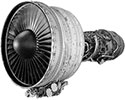
PCC combines 11 small castings into a single part for GE's CF6-50 engine; led to replacing multiple fabrications with one piece castings.
-
1980

PCC builds a plant to specialize in small to mid-size castings and make room for growth of newly designed large parts.
-
1981

Pratt-Whitney begins using PCC castings on their PW2037 engine for the Boeing 757.
-
1982

GE CF6-80C engine for Boeing 747 and 767 launches with PCC turbine rear frame and compressor rear frame. PCC breaks ground on a plant to support the world's largest, high-volume titanium casting, the GE CF6-80C fan frame.
-
1986

Formerly a division of TRW, Cooley bets the company on a business that is losing money; PCC Airfoils becomes profitable in its first year; employment grows to 2,000.
-
1987-1998
Initiated plants in Oregon and Ohio to serve the industrial gas turbine market; Rolls Royce joins GE and P&W by incorporating large, complex castings into their engine designs; PCC employs 7,500 people.
-
1999

PCC acquires Wyman-Gordon
Wyman-Gordon is a forging business with locations in MA, TX, and Scotland; also owns several small casting companies.
-
2003

PCC acquires SPS Technologies
SPS makes critical fasteners for the aerospace industry; the acquisition establishes a new Fasteners platform to which PCC adds several more businesses.
-
2006

PCC acquires Special Metals
Special Metals, the world leader in high nickel alloys, has invented and patented over 70 industry-leading alloys, many engineered for the most brutal, mission-critical services in aerospace and other industries.
-
2011

PCC acquires Primus Intl.
The Primus acquisition creates an Aerostructures platform and is the springboard for many related acquisitions.
-
2013

PCC acquires TIMET
TIMET has led the industry in titanium products since 1950, supplying nearly 1/5 of the world's titanium demand; PCC becomes the largest titanium sponge producer and melter in North America.

PCC acquires Permaswage
Permaswage designs and manufactures permanent fittings used in fluid conveyance systems for airframe applications, as well as installation tooling.
-
2015

PCC acquires Noranco
Noranco is a premier supplier of complex machined and fabricated components for aero-engine, landing gear and airframe applications.
-
2016

PCC aquired by Berkshire Hathaway
On January 29, Berkshire Hathaway completed its acquisition of Precision Castparts Corp. for $37.2 billion.

